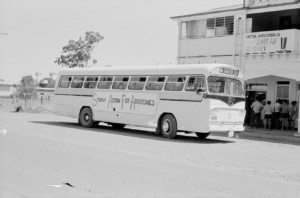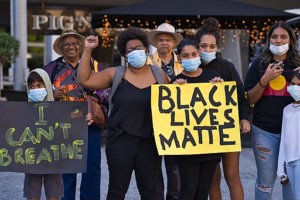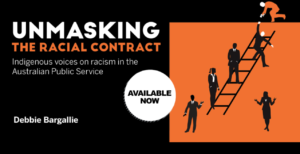It’s Reconciliation Week, with this year’s theme being “Be Brave, Make a Change”. This raises questions such as “What does this mean?” and “How can ‘Make a Change’ go beyond rhetoric and symbology and translate into explicit accountability and meaningful, ongoing action?”
Reconciliation is an institutional responsibility for everyone, a call to action to learn, listen, understand and act on all levels of racism and the disadvantage that prevails in Australia on a day-to-day basis. Rather than being about bravery, this work should be positioned as social justice and seen as moral obligation.
Dr Debbie Bargallie, a critical race scholar from GIER says:
“Reconciliation is not something that can be achieved by individuals alone, it is an ongoing journey of collective solidarity – it is about taking action for real change – creating equity. It’s about more than the rhetoric that ‘all will be fine if we all just get along’’, or attending a Sorry Day event, or doing a tokenistic Acknowledgement of Country before a meeting. Reconciliation is about what non-Indigenous Australians should be doing to understand their position in the history of this country.”
Dr Bargallie compels us to use this week as a reminder of not just considering that we live on the lands of the oldest continuing civilization on the planet but having the will to embrace Aboriginal and Torres Strait Islander knowledges, voices, and perspectives on an everyday basis, stretching beyond the tokenistic symbols of a notable week or a day. Dr Bargallie believes one of the most important actions to be taken now is instigating the Uluru Statement from the Heart bringing a First Nations voice into Parliament.
“We need to make it our business to understand the Uluru Statement from the Heart – to understand the meaning of ‘Voice Treaty Truth’. Reconciliation is not about rhetoric of Reconciliation Actions Plans (RAPs) and Reconciliation Statements that do not come with money and explicit accountability. Reconciliation is about action, agency, responsibility, and accountability.”

1965 Freedom Ride. Photo in the public domain.
Over the last fifty years there have been numerous Commissions, Inquiries and Reports relevant to Indigenous Affairs that have acknowledged the importance of reconciliation. Significant among them are the Final Report of the Royal Commission into Aboriginal Deaths in Custody (1991), and the Bringing Them Home Report (1997). A defining moment in Australian activism and collective solidarity that brought awareness of the plight of Aboriginal people in New South Wales towns into the social consciousness was the 1965 Freedom Ride instigated by Aboriginal Australian activist Charles Perkins and students from the University of Sydney Student Action For Aborigines group (SAFA).
The SAFA group hired a ‘ Freedom Ride’ bus and took a 15-day journey through New South Wales campaigning against the marginalisation of Aboriginal peoples in New South Wales towns. The group ensured they had extensive media coverage to bring the issues of racial discrimination to the attention of national and international press.
Similarly, the 1966 Wave Hill walk-off and strike by 200 Aboriginal stockmen, house servants and their families led by Gurindji man Vincent Lingiari supported by non-Indigenous people, including unionists for the return of some traditional lands, and better working and living conditions drew national and international attention. This fed into the 1967 Referendum, which resulted in a change to The Constitution of Australia so that like all other Australians, Aboriginal and Torres Strait Islander peoples would be counted as part of the population and the Commonwealth would be able to make laws for them. Thousands of Australians came together to work on the 1967 Referendum Campaign making it one of the most successful campaigns in Australia’s history.
More recently, key acts of solidarity have included the Black Lives Matter movement , where thousands of Australians protested at rallies across Australia to oppose the deaths of Indigenous people in police custody. Mining giant Rio Tinto have also been subjected to backlash and public inquiry when they failed to uphold values of respect for local communities and their heritage in destroying the 46,000 year old Aboriginal Juukan Gorge caves in Pilbara, Western Australia which had shown evidence of continuous human habitation since the last Ice Age.

Brisbane BLM Protest. Photo: Wikimedia Commons
These movements have resulted in several plans being put in place to address reconciliation, but not all been put into practice. Since 2006, Reconciliation Action Plans (RAP) has been used as the primary vehicle for workplaces as formal statements of commitment to reconciliation. Dr Bargallie says however that often
“institutions use RAPs as a way to give the illusion that they are not racist and to mask racism under the veil of inclusiveness. This illusion permits many non-Indigenous peoples to live in a world of false deception about the nature and operation of racism”.
There is still a lot to be done in reframing the thinking of Australia as a “young country” to one that is built upon the oldest continuing culture of the world. The recent election has resulted in Australia’s new parliament looking to be the most diverse it’s ever been, with both Northern Territory Senate spots to be held by Indigenous women – Labor’s Malarndirri McCarthy was re-elected and would be joined by the Country Liberal’s Jacinta Price. In the House of Representatives, Linda Burney is set to become the first female Aboriginal minister for Indigenous affairs.
This moment, this week, is yet another chance for all of us to create space to embrace the knowledge, voices, and perspectives of Indigenous peoples in our work and lives. This can mean having difficult conversations, listening to, reading, and implementing the work of Indigenous scholars, writers and leaders and taking practical steps toward transformative change
As Dr Bargallie says:
“We need to get comfortable with listening to uncomfortable truths. Aboriginal and Torres Strait Islander people don’t want to just be a performance or be seen as tokens in workplaces. It is important that days/weeks like this are used to critically ask ourselves: How complicit am I in producing and perpetuating epistemic violence and other racist practices?”
To read further into these issues please see:

Unmasking the Racial Contract by Debbie Bargallie
Uluru Statement from the Heart


